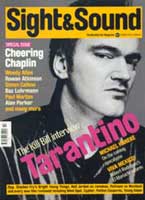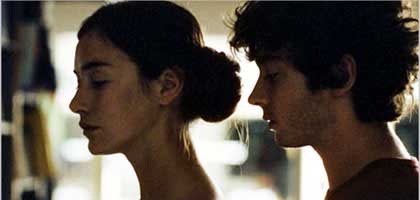
Summer's Tale
Film of the Month: Le Chignon d'Olga

Le Chignon d'Olga is a subtle tale of grief, first love and erotic obsession. By Philip Kemp
The after-effects of bereavement on a family is a subject much in vogue in recent years: films as different as Nanni Moretti's The Son's Room, Todd Field's In the Bedroom and Kenneth Lonergan's You Can Count on Me have examined the way the loss of a family member can corrode and distort the relationships of those left behind, stirring up submerged feelings of resentment, inadequacy or guilt, revealing cracks in a facade of seeming contentment. Jérôme Bonnell's debut feature Le Chignon d'Olga starts with the mother's death already some months in the past, so we don't get to see the family's previous state of comparative happiness although from the survivors' desperately stalled neediness and inability to communicate with each other on any but a trivial level, we can surmise it may have been interdependent to an unhealthy degree.
Indeed, a good deal of what's going on in this film is left to us to deduce; apart from anything else, it's a while before we realise that the mother died recently. This is deliberate: Bonnell notes that he "wasn't interested in explaining things. As a spectator, I always prefer not to understand than to understand too much." The effect is to make us watch more closely, picking up on subtle inflections and half-sketched gestures that give away more than the words they accompany.
Delicately stated emotional undercurrents, misdirected erotic attachments, articulate, civilised dialogue and a strong sense of place we're unmistakably in Eric Rohmer territory here. Not that Bonnell seems anxious to disavow his antecedents. On the contrary, he calls attention to them in the very title of his film, which recalls one of Rohmer's earliest hits, Le Genou de Claire (Claire's Knee, 1970), which also features a male in the grip of an unrequited passion directed at the wrong love-object.
Risky, of course, for a beginner openly to court comparison with such an accomplished master of cinema, and the effect is to make us more aware of lapses in tone and narrative skill that might otherwise have been indulgently overlooked in a debut film. In particular, it's hard to imagine Rohmer even in his early days perpetrating such a clumsy coarsening of the tone as does Bonnell in the episode of the botched 'heroic rescue' devised by the teenage son of the family Julien with family friend Pascal in a misguided attempt to appear noble in the eyes of Olga, the young bookshop assistant with whom he's obsessed. For one regrettable moment the film lurches towards Dumb & Dumber territory.
It's also likely that Rohmer, always sympathetically attuned to the feelings of young women, would have swung the focus far more towards Julien's older sister Emma. Half-fascinated and half-repelled by her friend Marion's lesbian advances and tormented by the unacknowledged incestuous possessiveness she feels towards her father Gilles, Emma would make a considerably more interesting subject for exploration than Julien. As it is, her furious attack on Gilles after he's had sex with local café owner Nicole feels undermotivated and unprepared for. Both Emma and Julien's friend (and, ultimately, lover) Alice are seen largely from the outside, since Bonnell seems set on having us follow Julien's much more conventional erotic awakenings. Hubert Benhamdine, making his screen debut, has something of the appealing vulnerability of Elijah Wood, and his inexperience as an actor is apt enough; but his callow moonings eventually become wearisome.
Still, setting aside comparisons with Rohmer not to mention Erick Zonca (La Vie rvée des anges), Diane Kurys and André Téchiné, all of whom could have brought intriguing slants to bear on this material there's a freshness and unforced intimacy about Le Chignon d'Olga that promises well for the 23-year-old writer-director's future work. "The tone's strange, a bit surrealist. The style's light," says Olga, recommending a book of poems to her young admirer and giving us a hint of what Bonnell may be aiming for and what, a fair bit of the time, he achieves. Much of the action takes place in half-light ? DoP Pascal Lagriffoul appears only to use available light sources enhancing the mood of half-realised impulses and gentle melancholy (although since most of the young women in the cast share the same slim, dark, classically French good looks, it can take a few moments to work out who we're looking at).
The film is set in August, the month of fermeture annuelle when most of France shuts down, and was filmed at that time as well. Bonnell specifically chose this deserted period of the year, "when there's a strange atmosphere... I wanted it to be as if time had stood still." Bereavement has suspended his characters in limbo and stalled their creative powers: Gilles, who writes children's fiction, can't produce anything that satisfies him, and Julien has abandoned his piano-playing since his mother's death. Emotional release leads to creative release, though not always in the same way: Julien, having at last slept with Alice, finds himself impelled to play the piano again, whereas Gilles, after enjoying al fresco sex with Nicole, finally feels free to abandon his writing and start a new career. Likewise Alice's ability to tap-dance to her desired standard depends on extricating herself from her relationship with her abusive boyfriend Grégoire.
Some of these connections are signalled a little too explicitly. In particular, Gilles' emotional immaturity seems more than a touch overdetermined: not only does he write children's books, but he apparently watches nothing but Chaplin's The Circus and can bond only with a nine-year-old boy. But the scenes with his nephew, whose arrival he initially views without enthusiasm, have a relaxed charm to them; the actors were evidently at ease and enjoying each other's company. Similarly, even if the last-reel outcome the bedding of Julien and Alice has been predictable almost from the start, it's played out with enough raw awkwardness to make for an authentic and satisfying conclusion.
